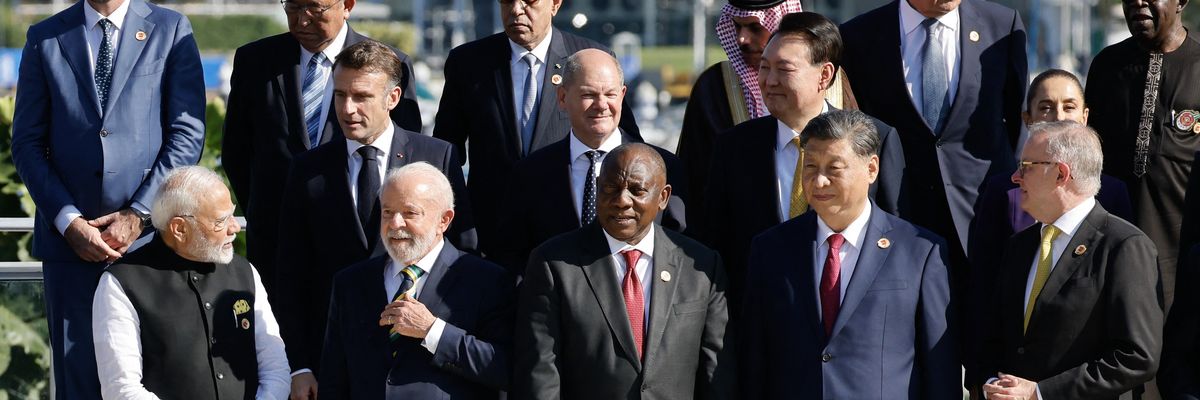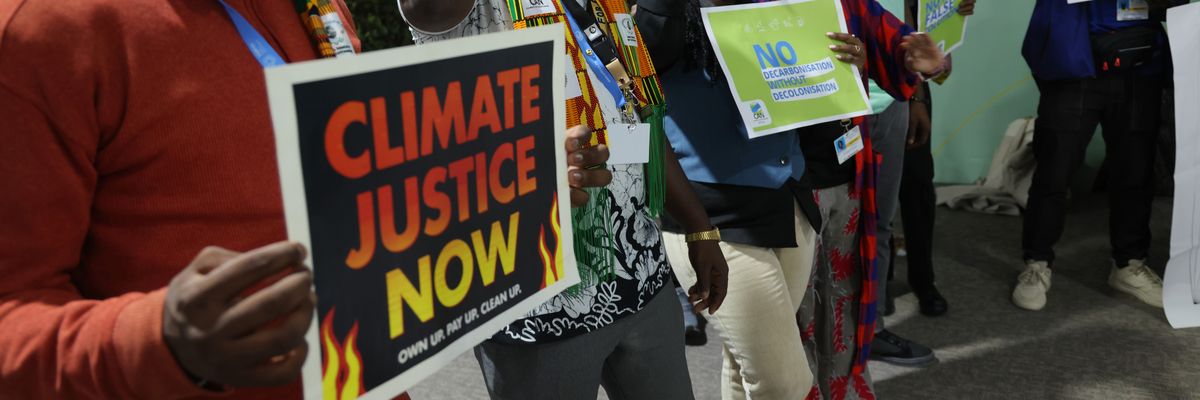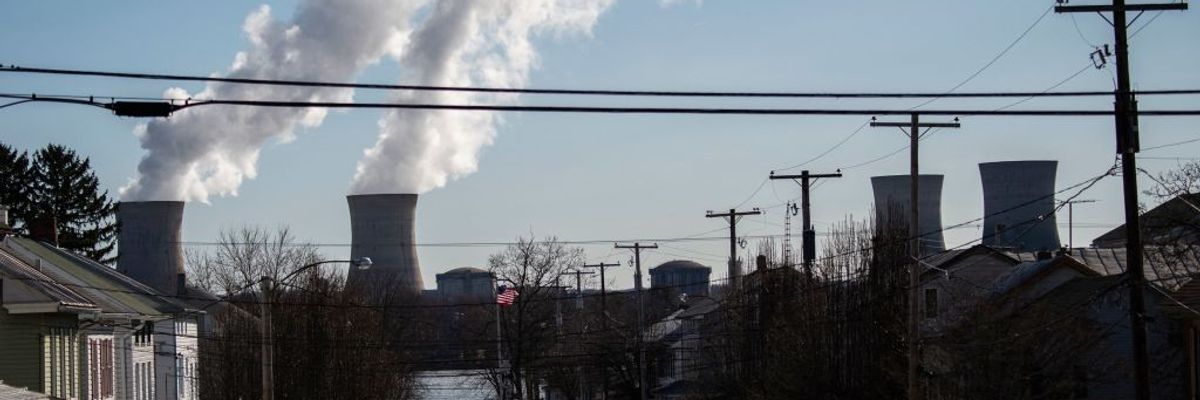"Now is the time to turn words into action and launch an inclusive international negotiation, extending beyond G20 countries, on the reform of the taxation of the superrich," said economist Gabriel Zucman.

India's prime minister, Narendra Modi, speaks with Brazilian President Luiz Inacio Lula da Silva as G20 leaders gather at their annual summit in Rio de Janeiro on November 18, 2024.
(Photo: Ludovic Marin/AFP via Getty Images)
Julia Conley
Nov 19, 2024
Acknowledging that "the era of the billionaire" is still in full swing across the globe, economic justice advocates on Tuesday applauded a "landmark commitment" by G20 leaders at the group's annual summit in Rio de Janeiro, where delegates agreed to cooperate on efforts to ensure the richest households in the world are taxed fairly.
The final communiqué out of the G20 Summit includes a commitment from 19 countries, the European Union, and the African Union, to "engage cooperatively to ensure that ultra-high-net-worth individuals are effectively taxed."
"Cooperation could involve exchanging best practices, encouraging debates around tax principles, and devising anti-avoidance mechanisms, including addressing potentially harmful tax practices," reads the communiqué. "We look forward to continuing to discuss these issues in the G20 and other relevant forums, counting on the technical inputs of relevant international organizations, academia, and experts."
The final text was brokered by Brazilian President Luiz Inácio Lula da Silva, commonly known as Lula, and the E.U. Tax Observatory noted that Argentina's right-wing president, Javier Milei, "failed to convince other G20 countries to block the communiqué."
The meeting took place less than a year after economist Gabriel Zucman, director of the E.U. Tax Observatory, published a report titledA Blueprint for a Coordinated Minimum Effective Taxation Standard for Ultra-High-Net-Worth Individuals, which informed G20 finance discussions leading up to the summit.

"A minimum tax on billionaires equal to 2% of their wealth would raise $200-$250 billion per year globally from about 3,000 taxpayers; extending the tax to centimillionaires would add $100-$140 billion," said Zucman, a leading expert on tax avoidance and reducing inequality, in the report.
Billionaires' effective tax rate is currently equivalent to 0.3% of their wealth, requiring them to pay a far lower rate than middle-class taxpayers.
Zucman hailed the agreement out of the summit in Rio de Janeiro as a "historic decision" and said concrete action by the world's governments must follow.
"Now is the time to turn words into action and launch an inclusive international negotiation, extending beyond G20 countries, on the reform of the taxation of the superrich," said Zucman.
Along with Milei, the Biden administration pushed back this year as the G20 weighed Zucman's tax proposal. Treasury Secretary Janet Yellen toldThe Wall Street Journal in May that the "notion of some common global arrangement for taxing billionaires with proceeds redistributed in some way—we're not supportive of a process to try to achieve that. That's something we can't sign on to."
As Common Dreamsreported Tuesday, the U.S. is one of eight countries that are contributing to an international loss of $492 billion in taxes each year as multinational corporations and ultrawealthy individuals underpay. The eight countries—which also include Australia, Canada, Israel, Japan, New Zealand, South Korea, and the U.K.—oppose a United Nations tax convention.
Jenny Ricks, general secretary of the Fight Inequality Alliance, said that particularly with U.S. President-elect Donald Trump set to take office in January, "we live in the era of the billionaire."
"We need to move to the era of the 99%," said Ricks. "This shift won't come easily. The U.S. elections have shown how the superrich can use their wealth and power to influence policies and shape the outcomes of elections. Leaders like Trump in the U.S. and Javier Milei in Argentina are actively working to derail international cooperation, while politicians around the world fail to oppose the vested interests that continue to benefit from such unequal societies."
"We will fight harder than ever before to transform the rhetoric on taxing the rich into a global reality," she added. "We need more equal societies in which the richest no longer hold all the power and wealth, with devastating consequences. We need to redistribute the wealth of the superrich to fund vital public services and the response to climate change. Such a transformation is essential to creating the alternative we seek to today's broken system."
Viviana Santiago, executive director of Oxfam Brazil, applauded Lula's government and the G20 leaders for responding "to people's demands worldwide to tackle extreme inequality, hunger, and climate breakdown, and particularly for rallying action on taxing the superrich."
"G20 governments deserve praise for their groundbreaking commitment to cooperate on taxing the world's superrich. But we won't rest until this delivers real change for people and planet," said Santiago, adding that governments now ostensibly supporting a tax on billionaires' wealth should also "be championing a $5 trillion climate finance goal at COP29," the U.N. summit set to wrap up in Baku, Azerbaijan this week.
"How can they argue that climate justice is unaffordable with a deal to raise trillions of dollars by taxing the superrich on the table?" she asked.
Quentin Parrinello, policy director at the E.U. Tax Observatory, asserted that negotiations on the tax proposal "must now extend to a much more inclusive space than the G20."
"Such reforms don't happen overnight, but time is pressing," said Parrinello. "This agenda is even more important today, with the risk of geopolitical fragmentation and looming wealth concentration fueling inequality and undermining democracy."
"We need to move to the era of the 99%," said Ricks. "This shift won't come easily. The U.S. elections have shown how the superrich can use their wealth and power to influence policies and shape the outcomes of elections. Leaders like Trump in the U.S. and Javier Milei in Argentina are actively working to derail international cooperation, while politicians around the world fail to oppose the vested interests that continue to benefit from such unequal societies."
"We will fight harder than ever before to transform the rhetoric on taxing the rich into a global reality," she added. "We need more equal societies in which the richest no longer hold all the power and wealth, with devastating consequences. We need to redistribute the wealth of the superrich to fund vital public services and the response to climate change. Such a transformation is essential to creating the alternative we seek to today's broken system."
Viviana Santiago, executive director of Oxfam Brazil, applauded Lula's government and the G20 leaders for responding "to people's demands worldwide to tackle extreme inequality, hunger, and climate breakdown, and particularly for rallying action on taxing the superrich."
"G20 governments deserve praise for their groundbreaking commitment to cooperate on taxing the world's superrich. But we won't rest until this delivers real change for people and planet," said Santiago, adding that governments now ostensibly supporting a tax on billionaires' wealth should also "be championing a $5 trillion climate finance goal at COP29," the U.N. summit set to wrap up in Baku, Azerbaijan this week.
"How can they argue that climate justice is unaffordable with a deal to raise trillions of dollars by taxing the superrich on the table?" she asked.
Quentin Parrinello, policy director at the E.U. Tax Observatory, asserted that negotiations on the tax proposal "must now extend to a much more inclusive space than the G20."
"Such reforms don't happen overnight, but time is pressing," said Parrinello. "This agenda is even more important today, with the risk of geopolitical fragmentation and looming wealth concentration fueling inequality and undermining democracy."















